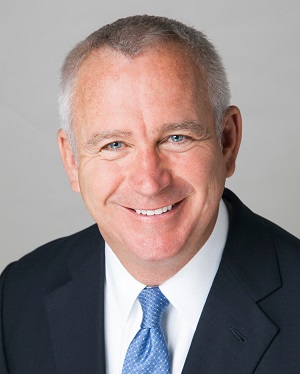Glenn McCoy, Dance/USA 2019 Ernie Award Recipient: The Consummate Arts Manager
5 Questions and Last Thoughts
By Lisa Traiger

Photo: Chris Hardy
Glenn McCoy’s career in the performing arts spans nearly 40 years of operations management and marketing in ballet and opera. He first joined San Francisco Ballet (SF Ballet) in 1987, and during his 32-year tenure has held the positions of company manager, general manager, and managing director. He was elected to the position of executive director in April 2002.
Next month at Dance/USA’s Annual Conference in Cleveland, Ohio, as McCoy prepares to step away from his position at San Francisco Ballet, he receives Dance/USA’s “Ernie” Award. The honor is given to an individual who has demonstrated extraordinary leadership, outstanding value in the field, and whose achievements have influenced and significantly advanced the work of artists and supported their creativity. Named for the late dancer, choreographer, director, AIDS activist and champion for the field, Ian “Ernie” Horvath, the Ernie recognizes Glenn’s passionate commitment to the national dance community.
McCoy has overseen the production of more than 130 new ballets and more than 50 tours, including engagements in Paris, London, New York, Beijing, and Washington, D.C. He supervised SF Ballet’s operations for the critically acclaimed international dance festival, United We Dance, in 1995; the company’s 75th Anniversary Season in 2008; and Unbound: A Festival of New Works in 2018. He has overseen tapings of Lar Lubovitch’s Othello, Helgi Tomasson’s Nutcracker, and John Neumeier’s The Little Mermaid, which have been broadcast on PBS by Thirteen/WNET New York’s performing arts series Great Performances, as well as Tomasson’s Romeo & Juliet, which premiered in Lincoln Center at the Movies’ Great American Dance series in 2015.
In addition, Glenn McCoy is an active leader in arts advocacy, spearheading two major ballot measures benefiting all arts organizations in San Francisco, including the successful passing of Proposition E, which restores arts funding for San Francisco arts and culture to the hotel tax without raising taxes. He is also deeply committed to advancing diversity, equity, and inclusion within the dance field, having launched SF Ballet’s DE&I Initiative.
Prior to joining San Francisco Ballet, McCoy held marketing positions at the San Francisco Opera and at The Metropolitan Opera in New York City, where as advertising manager he was responsible for promoting The Met seasons of American Ballet Theatre, as well as other international dance companies including Paris Opera Ballet, The Royal Ballet, the Bolshoi Ballet, and Japan’s Grand Kabuki. McCoy has served on the Board of Trustees of Dance/USA, the national service organization for professional dance. A native of New Bern, North Carolina, McCoy earned his Bachelor of Arts degree in theater and communication arts from Appalachian State University in North Carolina.

SF Ballet Artistic Director and Principal Choreographer Helgi Tomasson and Executive Director Glenn McCoy Photo: Erik Tomasson
Dance/USA: Congratulations on your achievement and on your remarkable career. You’ve spent more than three decades at the San Francisco Ballet, first as company and general manager, before being appointed executive director in 2002. What has kept you committed to working for the same company for so long?
Glenn McCoy: Without question, it’s been the people. I’ve been here long enough to watch some dancers come out of our school, enter the company, rise through the ranks to principal dancer, then join the artistic staff as ballet masters. That has been very inspiring to watch. And, as I grew older, I found joy in nurturing our staff. Seeing myself as teacher and mentor is an endless source of satisfaction for me because there is always a new generation eager to learn.
D/USA: Can you discuss three of your proudest achievements during your tenure at the San Francisco Ballet?
G.M.: I would say —
- Helping stabilize SF Ballet’s finances so that we have a solid foundation from which to do more, and more creative work
- Helping produce several major festivals that made commissioned work their focus felt important to our field and to our artists’ development
- Helping return SF Ballet to television after a nearly 20-year absence helped amplify the company’s reach and reputation
- I’m also proud that we have maintained a pretty harmonious workplace for our employees for these past three decades, even through some very difficult times.
D/USA: Can you share with us the three questions you ask yourself before moving forward with a career or company decision and why that works for you?
G.M.: Early in my career I didn’t have much of a plan. I just knew I wanted to be in the performing arts. I decided to create a test that I would use to evaluate any career opportunities that arose, externally or within SF Ballet. The test consisted of these three questions:
- Would I be proud of the work we were producing?
- Did I like and respect the people I’d be working with?
- Did it look like FUN?
If I couldn’t answer “Yes” to all three questions, I’d take a pass. It worked out pretty well.
D/USA: You have helmed the oldest ballet company in America, the second largest with an annual budget of more than $55 million. When you have faced a challenge or needed advice, where or to whom did you turn?
G.M.: I’ve been blessed with a supportive and committed Board, an artistic director with a clear vision, and staff who are in many ways smarter and more creative than I am, so there’s never been a shortage of advisers. Colleagues I’ve met through Dance/USA have been a tremendous resource to me. I’ve also maintained pretty good life/work balance and could rely on trusted friends outside the business for more objective input. I’ve never been afraid to ask for help.
D/USA: What are your thoughts on the state of the dance field in 2019 and moving forward? What challenges and successes are in store?
G.M.: I’m very optimistic about the future of dance. I believe our work speaks to people, especially young people, in a visceral way that can challenge, excite and entertain, and soothe. We need that more than ever right now. The work itself will continue to evolve as new generations of artists adapt it to tell their own stories. And I’m especially interested in how dance artists are collaborating more with artists from other disciplines to create something new.
I do believe we need to work more deliberately and mindfully to create opportunities for different voices so that our organizations, and our work, is more inclusive. There will always be challenges — with finances, leadership, technology, you have it — but relevance shouldn’t be what kills our art form if we are open and adaptable.
D/USA: What advice do you have for the next generation of leaders in the dance field, administrative or artistic, or both?
G.M.: I believe that the most successful administrative leaders will be the ones who are able to achieve healthy balance in their organizations in all things. I believe it’s our job to make the work happen and that often means acting as the bridge between artistic vision that pushes the envelope and the realities of financial limitations and boards’ natural pragmatism. It’s an increasingly fluid dance and often requires you to “hang out with don’t know.” Sometimes you have to get comfortable with ambiguity for a while.
D/USA: What are your thoughts on receiving the Ernie Award?
G.M.: I never met Ernie, but I did know his partner Denis Nahat. In my early years with Dance/USA, Ernie’s name was often raised with great admiration. I wish I’d had the opportunity to know him. I’m honored and touched to receive the Ernie from Dance/USA. It means a great deal to me to be recognized by my colleagues in the dance field.
D/USA: Last thoughts?
G.M.: Only how grateful I am to Dance/USA and all the many dance professionals I have known through the organization these past three decades. My involvement with Dance/USA was, without question, the most important professional development and networking tool I had. That’s one reason why, upon my retirement, SF Ballet is establishing the Glenn McCoy Executive Director’s Endowment, a fund that will support more training and professional development opportunities for SFB staff, like participation in Dance/USA.

Lisa Traiger edits From the Green Room, Dance/USA’s online journal, and writes frequently on dance and the performing arts for publications, including Dance, Dance Teacher and Washington Jewish Week. An award-winning arts journalist, she is a former co-president of the Dance Critics Association and holds an MFA in choreography from University of Maryland.
____
We accept submissions on topics relevant to the field: advocacy, artistic issues, arts policy, community building, development, employment, engagement, touring, and other topics that deal with the business of dance. We cannot publish criticism, single-company season announcements, and single-company or single artist profiles. Additionally, we welcome feedback on articles. If you have a topic that you would like to see addressed or feedback, please contact communications@danceusa.org.
Disclaimer: Opinions expressed in guest posts do not necessarily represent the viewpoints of Dance/USA.




